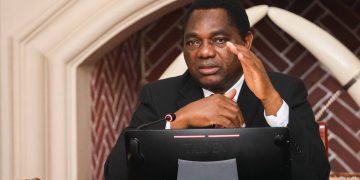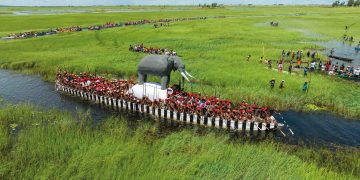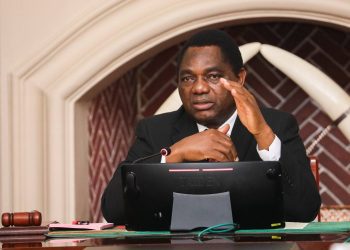By Ambassador Evans Kazonga Ng’oma, Founder & CEO BuyZed Campaign and Dr. Kamayoyo Kelvin, BuyZed Chief Technical Advisor & Strategist
29.03.2024
Zambia is now a vivid shining example in the world especially among the developing countries as being one of the *smartest* countries to have successfully navigated an awful national debt monster. Certainly, other countries will now have to look up to Zambia for success stories or lessons learnt in traversing a rough path towards securing a successful national debt restructuring deal.
BuyZed Campaign, therefore, is proud to join other organisations and the general populace in congratulating the *Republican President, Mr. Hakainde Hichilema* for having methodically led the entire country of Zambia into this memorable and successful achievement. Not only has unerasable history been made but also such history will immediately begin to bear desirable social and economic returns that nourishes a strong foundation for increased momentum of Zambia’s *economic recovery.
As a country, Zambia will never be the same again post this milestone that has resulted into a successful debt restructuring deal. However, to eliminate the potential manifestation of a _” *double-edged sword*”_ we wish to introduce the role of culture and it’s importance. By introducing the role of culture and its importance, we endeavour to ask the following question: _What type of culture should citizens embrace in order to maximise full benefits of the successful debt restructuring deal?_ While the answers to this question might be myriad some thoughts are an integral component of such answers and remain unavoidable.
For instance, individuals and society at large must adopt or embrace a suitable culture that is responsive and meets their expectations going forward. Thus, such a culture should be one that allows Zambians to interact more on constructive issues that propel business initiatives, embrace modern technology and artificial intelligence, pursue partnerships anchored on mutual trust and honesty, and invest in market intelligence and profitable market discoveries.
Following the successful debt restructuring deal that qualifies to be among the *2024 national financial and macroeconomic landmarks, the three (3) basic practices or things ought to happen in order to maximise the gains, thereof:
(i). The business and investment climate must be greatly improved in order to allow the ever growing skilled *youthful* population to be able to harness the existing and emerging opportunities and also start-up profitable enterprises;
(ii). A robust economic policy shift both in prescription and actual implementation must be pursued in order to give stimulate incentives to the *indigenous or local* *entrepreneurs* to actively participate in investment ownership and enjoy substantial equity control for sustainability and broadbased growth; and
(iii). The country must make significant effort to move from *primary industries* to *secondary industries* or *manufacturing economy* anchored in order to create a huge pool for decent job opportunities and stabilize the *exchange* *rate* for macroeconomic stability. As a country, we need to start producing more of what we traditionally consume in order to bring about a balanced but elevated national economic equilibrium that supports a growing society and makes the economy competitive on the international platform.
Zambia must also produce more *agricultural commodities* in order to reduce the exogeneous shocks orchestrated by *climate change* , inter alia, which end up inducing food insecurity and trade imbalances. All these incidences ultimately negate the country’s exchange rate and pushes the citizens into mere micro-crossborder traders with miniature returns which only makes them perpetual small scale entrepreneurs as opposed to them graduating into serious large scale players on the international market.
Undeniably as a country, Zambia is on the right path and we are inspiring other countries across the continent of Africa and beyond. However, there is still more to be done especially in terms of building *consensus* and *literacy* about our national socio-economic transformation agenda so that everyone is on the same page and pull in the same positive direction. While this task may appear to be complex, BuyZed Campaign believes through *participatory* and *multidisciplinary* approaches and countrywide stakeholder *(i.e, including traditional leaders)* engagement all things are possible.
Zambia has great potential for growth and the successful debt restructuring deal gives the country enormous and unquestionable relief to be able to adjust and effectively reposition itself for accelerated growth and industrial take-off anchored on diversification, value addition and local content. Additionally, this unprecedented development will enable the country to aggressively combat poverty both in urban and rural communities of Zambia while implementing inclusive policy interventions and embracing modern technology in order to build synergies in all transactions and production techniques.
Notwithstanding, every landmark occurrence often comes with its own unique cultural demands in the way society and the economy responds to the achievement so as to translate it into indelible socio-economic transformation and gains. Its now time to better understand the type of culture economic actors and society at large is going to adopt in order to fully harness the benefits that the debt restructuring deal brings.
In conclusion, through this debt restructuring deal, the country has since engaged into a positive trajectory gear towards the *ZAMBIA WE WANT* for a better shared future, sustainable and prosperous nation. The period is also crucial because as a country we are now seven years away from Zambia’s *Vision 2030* aimed at “attaining prosperous middle-income nation status” and *Sustainable* *Development Goals* aimed at ensuring that by 2030 “all people enjoy peace and prosperity.” In other words, the debt restructuring is a *stimulus package* in itself and if well harnessed and supported by all Zambians and other stakeholders, it can significantly improve the economy of the country and positively transform many lives.





































